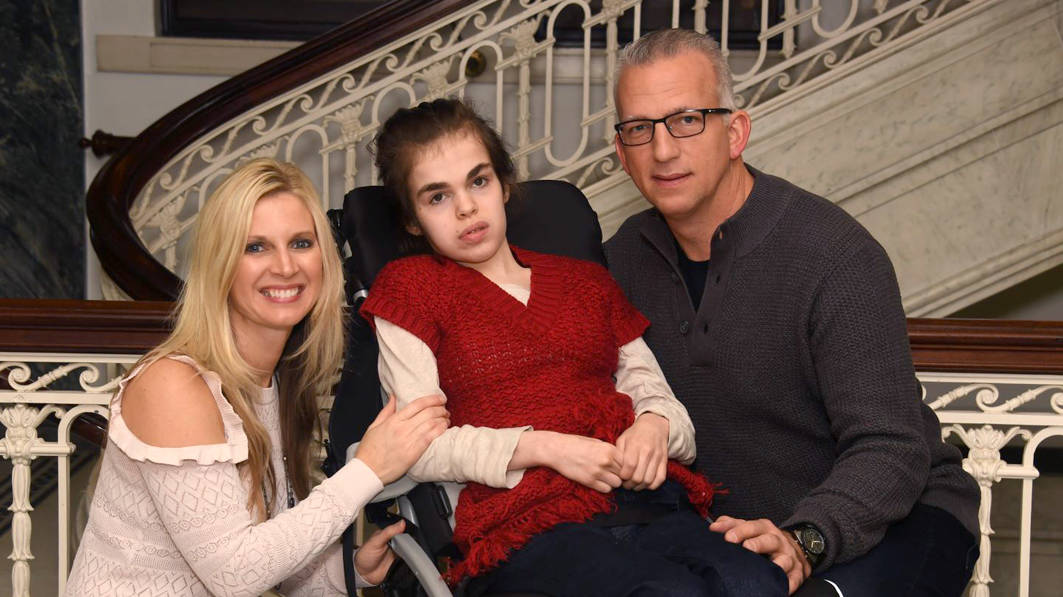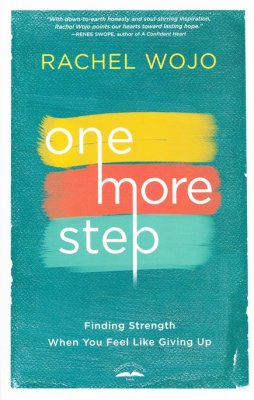Many little girls grow up playing with dolls and dream of being a mommy one day. Rachel Wojo was one of them. She longed to hold a baby of her own and help her child grow up to live a long, full life of knowing Jesus and loving others. But after being delivered via emergency C-section and struggling with daily skills throughout infancy, toddlerhood and preschool, Rachel’s firstborn, Taylor, was ultimately diagnosed with a rare neurologically-degenerative disease. Taylor’s expected life span was just 10 to 15 years, and any skills she gained, Rachel learned, she would eventually lose on a slow, debilitating journey backward. As she describes in her book, One More Step: Finding Strength When You Feel Like Giving Up, Rachel has learned to keep going through the hard spaces of life.
____________________
There are some moments in life you will never forget. You can recall exactly where you were sitting, the clothes you were wearing, perhaps even the smell in the air. You remember those details because the very next moment slammed into your heart like a freight train. I had a moment in life like that, and I know exactly where I was. I remember it like it was yesterday, even though 17 years have passed.
By 2001, I had spent four years trying to find a doctor who could tell me what was really wrong with my sweet girl, Taylor. Her emergency delivery and lack of oxygen at birth had resulted in a label of “developmentally delayed.”
Taylor was beautiful and fun and energetic. She could sing like a little bird with perfect pitch and knew dozens and dozens of songs by heart. There were so many things to love about Taylor: Her bouncy step and girly grin. Her zany curiosity. But it took a little longer for her to reach certain developmental milestones. The older she grew, the more my mama’s heart felt less that “something wasn’t quite right” and more that “something is definitely wrong.”
My husband, Matt, worked the nightshift at the time, so after Taylor fell asleep, I sat alone in front of the computer, reading and researching. The week before, Matt and I had taken Taylor to a specialist who had, for the first time in years, given me hope. The doctor spent two hours with us, firing off questions at a rapid pace, and she seemed intrigued with Taylor. I felt mounds of relief just from meeting this woman. Surely she would get to the bottom of Taylor’s delays.
When her four-page letter arrived in the mail earlier that day, I could hardly wait to tear it open. Once I landed on the last page and saw the list of 14 potential diagnoses the doctor wanted to rule out, I knew what I would be doing that evening. I Googled each of the 14 possibilities, longing to understand how to help my little girl. Yet nothing on the doctor’s list seemed to mesh with Taylor … that is, until the very last description.
Upon reading the details about “mucopolysaccharidoses,” I connected the dots of Taylor’s life, from infancy to preschool. Every line in the description matched another trait of my little girl. The tears slid down my cheeks. The future I had always dreamed of vanished in a split second.
By the time I reached the words, “As the disease progresses, there is widespread damage throughout the body, including the heart, bones, joints, respiratory system and central nervous system, resulting in an average lifespan of 10-15 years,” my tears had blurred out the remaining words on the screen. I wiped my eyes and kept reading: “There is no cure or treatment.”
Four more months passed before the test results finally confirmed what I had learned that night. Before the diagnosis, I held out hope that everything would be OK once we figured out what was wrong. I thought that if we could just put a label on Taylor’s disease, then we would be able to make progress toward healing.
But God had a different plan for Taylor’s life. For our lives.
Maybe you’re reading this article because you’ve been there. Maybe your news arrived via phone call or in the doctor’s office. Maybe the diagnosis wasn’t terminal, but it rocked your world nonetheless. That’s what happens when you or a loved one receives a life-defining label: The diagnosis and all its implications sink into your heart and mind, leaving you devastated and devoid of the hope you held on to until that moment when the truth was revealed.
If it wasn’t for that moment in front of the computer all those years ago, I might be tempted to “insert encouraging words here.” I wish I could sit beside you right now and give you the permission to ache openly and freely. But instead, let me whisper to your heart: God has carried Taylor and our family all of these years, so I know that He will carry you, too.
I took the little bit of hope I had before the diagnosis and placed it on Jesus – the perfect Hope-Holder. Today, that tiny little bit of hope has blossomed into a 17-year testament of trust. I stopped wishing for a good outcome and started getting to know my God. And if there’s one more thing I could speak to your heart, this time a little louder: When things are out of control, God is always in control.
A diagnosis doesn’t define our joy; joy defies any diagnosis. That hope you held on to before the label arrived? It still exists. It simply needs to be transferred from the answer you longed for to the One who knows all the answers.
God wants to give us so much more. He wants to give us himself.
____________________
Editor’s note: Since the writing of this article, Rachel’s daughter Taylor has passed away.
Rachel Wojo is the author of One More Step
She has faced experiences that crushed her dreams of the perfect life: a failing marriage, a daughter’s heartbreaking diagnosis, and more. In this book she transparently shares her pain and empathizes with yours, then points you to the path of God’s Word, where you’ll find hope to carry you forward.





















